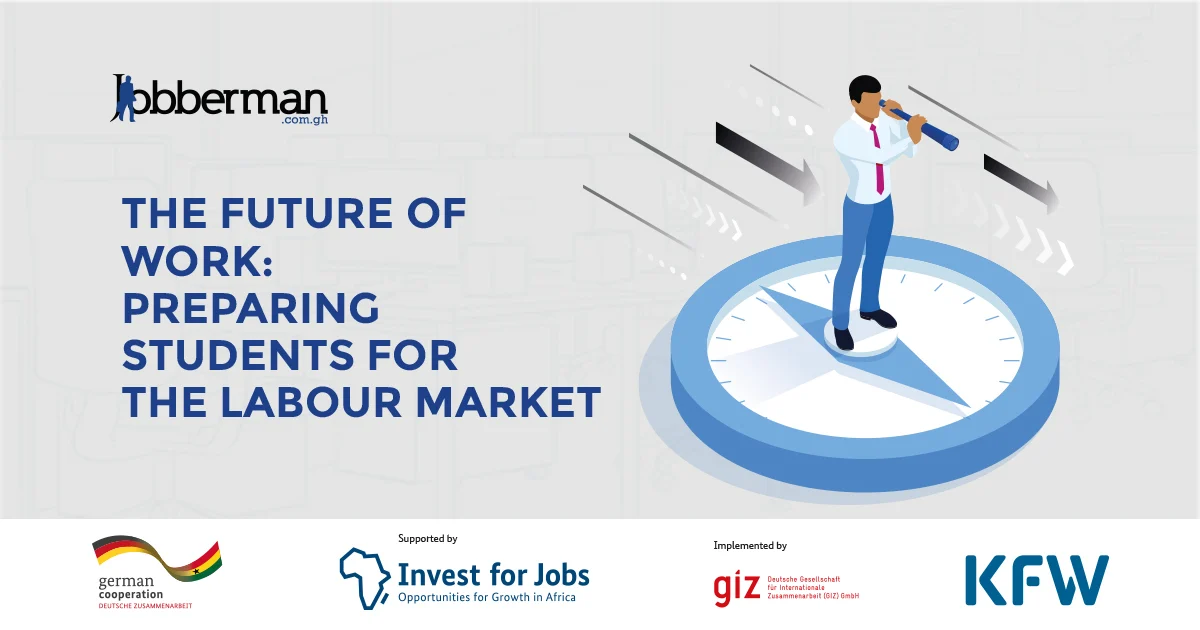The dream of every tertiary student is to complete school and find descent work to earn a living. Hence, we ask the question, how prepared are young graduates for the labour market?
And what are the trends with regards to the local and international labour market and the strategies to land a job after school.
We caught up with the head of recruitment at Jobberman Ghana, Michael Akwasi Gyimah and this is what ensued.
GA: Hello Michael, it was a great day to have a chat with you regarding young graduates and their preparation for the labour market.
MAG: Thank you Genevieve for the opportunity.
GA: What does the future look like with regards to jobs in Ghana?
MAG: The COVID-19 pandemic has affected the way businesses manage their human resources and has forced a lot of organizations to adapt to the new normal with regards to managing their workforce. As much as we are not expecting to revert to the old ways of doing things, there are still employers and customers who still prefer the traditional channels of deliveries, thus demanding companies to use the HYBRID or right MIX channel to keep everyone happy.
GA: Do you think students in tertiary institutions are prepared for the labour market?
MAG: It will not be fair to say NO because some organizations can still make good use of graduates from our universities but with the new and emerging industries in E-commerce, Financial Services, Oil and Gas, Agrobusiness, etc and the skill set being acquired, I believe as a country we must take cognisance of this and re-engineer our educational curriculum to meet these new demands.
GA: As an experienced recruiter, who serves as an advisor for employers looking for qualified candidates to fill their vacant positions, what do you think is the most peculiar skill(s) set employers require of professionals?
MAG: The evolving needs of the economy is demanding and will continue to demand technology creativity and not only users and this implies a re-focus of education in Science, Technology, Engineering, and Mathematics (STEM) which will be necessary for job security in the future.
GA: What are the job trends?
MAG: Locally, there are more demands for business development and sales professionals for both product and services, digital marketing roles, graphic design, website developers, office administration/management role etc. The international labour market, seeks for data science experts, business intelligence, artificial intelligence experts, UX/UI designers, healthcare professionals, cyber security expert among others.
GA: Which industry looks promising with regards to jobs?
MAG: Information, Communication, and Technology still look more promising with the Sales and Marketing sectors also looking good.
GA: Many times we hear the cliche from job seekers; “All the vacant roles being advertised require 2 or more years of experience in related fields.
Do you think every job demands experience or just acquired knowledge guarantees one of getting a job right after school?
MAG: Most jobs demand hands-on experience which comes with consistent practice to create confidence and competency in new recruits.
GA: Per your daily interactions with job seekers, do you think fresh graduates are adequately prepared for the job market?
MAG: As I mentioned early, some organizations make good use of them but most companies will trust their systems into experienced hands.
GA: Do you think our tertiary institutions are doing enough to prepare graduates for the job market?
MAG: I strongly think there is more to be done to bridge the gap between employability skills and what is taught in schools.
GA: From the recruitment point of view what makes candidates stand out and more attractive to potential employers?
MAG: I will say skill set, experience, etc on a well-written CV and Cover letter.
GA: At what point would you say graduates are adequately prepared and ready for work.
MAG: Well, I believe that right after school, yet there are so many ways to get hands on experience as a young graduate. These include taking internship and volunteering opportunities.
GA: Could you conclude with some strategies to help graduates prepare for the world of work?
MAG: Have a plan to efficiently and effectively use the resources that you have to land your dream job. After school, there is enough “Time and Energy” to study more on your career.
- Gain more experience by learning the principles of your career by taking up internship opportunities (with or with no allowance).
- Target the right hiring/recruitment companies like Jobberman, create career networking and and be open to mentorship.
- Customize your resume and cover letter to suit the job advertisement. Make sure your CV is always marketing you in the right way to the right employers/ recruiters.
GA: Thank you Michael for your time.
MAG: Thank you Genevieve for having me.
This article is in partnership with Invest for Jobs, an initiative of the German Federal Ministry for Economic Cooperation and Development, and has partnered with Ghana’s number one online recruitment platform, Jobberman Ghana. This partnership is aimed at contributing to the special initiative’s objective of improving economic conditions in selected locations and industry sectors in Ghana, as well as promoting investment for jobs.





